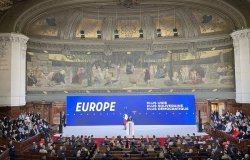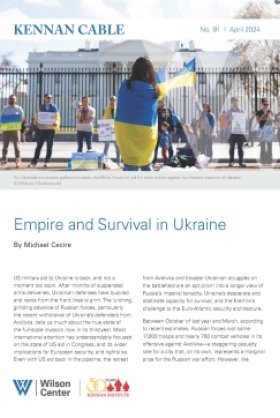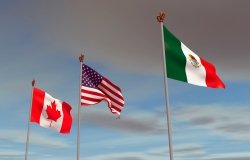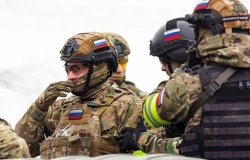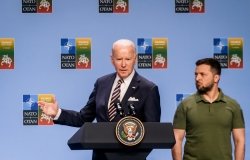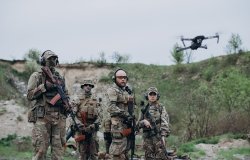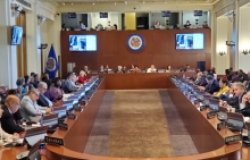North Korea's Dangerous Ambition
North Korea's first successful rocket launch is a truly dangerous development. Although the North Koreans have previously detonated two nuclear devices, until now they have not demonstrated any ability to deliver them. Weaponizing a missile is hard, but Pyongyang's close ally Iran has made great advances in miniaturizing warheads. With the combination of North Korea's nuclear bombs and Iran's technology, a nuclear-tipped missile could be capable of striking the West Coast of the United States in the near future. We can no longer afford to ignore North Korea.
North Korea's first successful rocket launch is a truly dangerous development. Although the North Koreans have previously detonated two nuclear devices, until now they have not demonstrated any ability to deliver them. Weaponizing a missile is hard, but Pyongyang's close ally Iran has made great advances in miniaturizing warheads. With the combination of North Korea's nuclear bombs and Iran's technology, a nuclear-tipped missile could be capable of striking the West Coast of the United States in the near future. We can no longer afford to ignore North Korea.
It is important to ask why North Korea launched the rocket now. A look at three target audiences provides clues: the North Korean people, the South Korean people and the U.S. government.
The North Korean leadership had been promising its citizens for years that the country would become "strong and prosperous" by 2012, the 100th anniversary of founding leader Kim Il Sung's birth. This was more crucial after the very public failed missile test in April became a source of national shame. Last week's successful launch produced euphoria and intense pride and fortified the authority of Kim Jong Un one year into his reign.
The second audience is the South Korean people. From across the heavily fortified demilitarized zone between the two Koreas, the North's missile test was a ham-handed effort to interfere in the South's presidential election Wednesday. But this attempted meddling will most likely backfire. Although the two candidates have expressed their commitment to improving inter-Korean relations, North Korea has criticized Park Geun-hye, candidate of the ruling conservative New Frontier Party and daughter of former President Park Chung-hee. Pyongyang seems to be sending the message that inter-Korean relations will remain as tumultuous as they have been over the last five years if another conservative candidate is elected.
The third audience is Washington. For more than 40 years, Pyongyang has been using military adventurism to try to get our attention. This began with the seizure of the Pueblo, a U.S. naval intelligence ship, in international waters in 1968. The U.S. response was to negotiate to recover the 81 surviving crew members and, in the process, sign an apology for committing espionage. The lesson the North took from that episode was that provocative action gets attention — a message reinforced when the U.S. ignored North Korea's repeated efforts in the 1970s to replace the Korean War armistice with a permanent peace treaty.
As convoluted as this may seem, North Korea's missile launch last week might just be a signal to President Obama — who will have more flexibility in his second term — to restart diplomacy. After all, when Obama was first campaigning for the presidency, engaging enemies was a central element of his foreign policy platform.
If this missile test was a cry for attention, then attention must be paid. Rallying the region, which has equal or greater cause for concern, is important, but bilateral diplomacy could achieve a breakthrough. The six-party framework has not been successful for one important reason: North Korea has historical grievances with each of the other five members. From the North Korean perspective, therefore, it is akin to five schoolyard bullies meeting with a former victim to persuade him to give up his one deterrent.
The U.S. has called for "consequences," though White House Press Secretary Jay Carney said that we would wait and assess action by the United Nations Security Council, which condemned the launch as a "highly provocative act that threatens regional security." Despite existing sanctions, North Korea, probably with Iran's assistance, continues to make technological advances.
It's time for the Washington to try a new approach. Instead of talk of consequences, the U.S. should talk about reengagement and what it would take for North Korea to be welcomed as a part of a vibrant Asian region.
Here's why the timing is right to restart bilateral diplomacy: the leadership changes in China and Japan; the upcoming elections in South Korea, which can lead to a reset in Pyongyang's relations with Seoul, Tokyo and Beijing; the U.S. rebalance to Asia, which is reinforcing relations with North Korea's neighbors; and the need to address the cataclysmic danger in the region, given the cooperation between Pyongyang and Tehran.
Justifying his policy of engagement with North Korea in the early 1970s, the late South Korean President Park Chung-hee suggested that "dialogue is needed because no matter how much you hate the other side, you know whether they will attack or not if you're holding their hand." Nothing else — especially the administration's policy of "strategic patience" — has worked, and the threat is only growing.
Jane Harman is director, president and CEO of the Woodrow Wilson International Center for Scholars. She was a nine-term congresswoman from California. James Person is coordinator of the center's North Korea International Documentation Project.
About the Authors

North Korea International Documentation Project
The North Korea International Documentation Project serves as an informational clearinghouse on North Korea for the scholarly and policymaking communities, disseminating documents on the DPRK from its former communist allies that provide valuable insight into the actions and nature of the North Korean state. It is part of the Wilson Center's History and Public Policy Program. Read more

Nuclear Proliferation International History Project
The Nuclear Proliferation International History Project is a global network of individuals and institutions engaged in the study of international nuclear history through archival documents, oral history interviews, and other empirical sources. At the Wilson Center, it is part of the Wilson Center's History and Public Policy Program. Read more

Hyundai Motor-Korea Foundation Center for Korean History and Public Policy
The Center for Korean History and Public Policy was established in 2015 with the generous support of the Hyundai Motor Company and the Korea Foundation to provide a coherent, long-term platform for improving historical understanding of Korea and informing the public policy debate on the Korean peninsula in the United States and beyond. Read more


